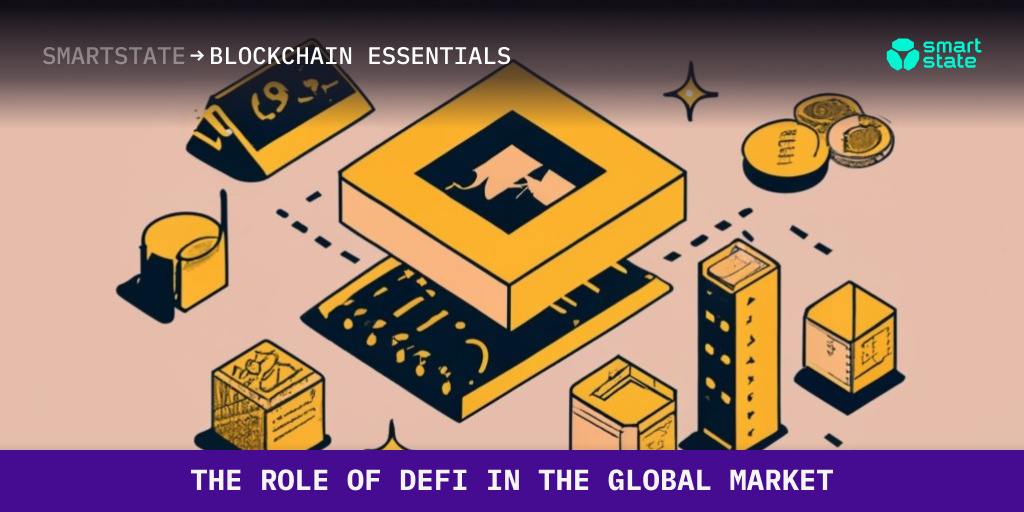The role of decentralized finance (DeFi) in the global market
The invention of the Decentralized Finance system made a revolution in global finance and brought about a bunch of innovative changes. Being built on blockchain technology, it opens access for the users to financial services without relying on traditional sources and institutions. It offers transparency, trading solutions, low costs, higher security and much more. The new services help to find solutions for the cases which were impossible or very hard to be solved with traditional tools and methods. The impact which Decentralized finance is producing on the global financial system cannot be underestimated.
DeFi projects provide users and investors with innovative tools and a wide range of opportunities from loans and trading to insurance with the help of protocols, smart contracts and other blockchain technologies. In short, it changes the interaction with financial services on the whole. The unnecessary intermediaries and third parties are being replaced by smart contracts and other useful tools making the interaction easier and efficient, and the central control is avoided taking the risks considerably down. Transparent and secure nature of a blockchain, which the Decentralized financial system is based on, helps its projects to avoid certain risks and become more secure. The development of smart contracts helps users to execute transactions easier, faster and on a more secure basis avoiding the need of third parties' intervention.
Certainly, there are some particular risks of emerging errors or vulnerabilities or malicious attacks on smart contracts, used in the DeFi ecosystem. Also there are certain risks of liquidity crunch or lack of investors' protection. Although blockchain offers solutions on how to mitigate such risks in the DeFi ecosystem. Blockchain solutions provide the smart contracts thorough testing and verification before deployment, taking down the number of errors. Blockchain also offers more traceability and transparency of the DeFi system with better monitoring of the users' activity which may lead to certain losses or disruptions. Blockchain technology ensures the investors' protection as well, offering a more secure and immutable transaction ledger, and provides users with an ability to track their funds on a real-time basis. To sum it up, blockchain features help to reduce the possibility of coding errors, attacks, flash loan exploitations, etc. to create a more secure and reliable DeFi ecosystem.
Blockchain-based DeFi advantages
Let's take a closer look at the particular advantages of blockchain-based decentralized finance.
- Decentralization. Reducing the interference of centralized institutions the transaction costs will go down, avoiding monopoly costs and unnecessary commissions. It will be impossible to monopolize the network depriving other participants of taking part in decision making. All the users can benefit from network effects and transaction possibilities.
- Innovativeness. Blockchain-based DeFi platform offers permissionless innovation owing to possibility for free creation and experimenting with new applications. It is possible to speed up the pace of financial system development and market competition due to combinatorial innovations, offering potentially better and less expensive financial services.
- Transparency. Transparency is one of the key benefits which a blockchain-based financial system provides users with. The ledgers of a decentralized finance system are secured by means of distributed consensus and radical transparency. Transactions are recorded and can be viewed and verified publicly. On the other hand, participants can make transactions confidently without trusted third party involvement. Moreover, blockchains are built with open source code, which allows checking business logic to find hidden vulnerabilities and potential risks.
- Interoperability and limitless. Blockchain-based decentralized financial systems are built on open standards and offer interoperability to users, which helps to avoid problems related to transaction barriers and different ledgers which traditional systems build separately. Interoperability allows seamless finance flow across different borders. It creates a truly borderless system which is not limited to geographical locations, governments, financial institutions or specific fiat currencies, making transactions easy and fast.
Business models
There are different financial business models, which are provided by blockchain technology. Each of them is based on particular components, which should include. They are decentralized currencies; decentralized payment services; decentralized fundraising; and decentralized contracting. Let's have a closer look at each.
- Currency. Cryptocurrencies are a key component of a decentralized economic system. They are not issued by a central bank of any country, they are not subjected to common inflation as fiat currencies are.
- Payment service. Blockchain-based decentralized systems offer low-cost borderless payments all over the world, which improves profitability and makes the systems more attractive to traders.
- Fundraising. A specialty, which is offered by blockchain technology. Its primary form is called ICO (initial coin offering, when a project-specific token is created and sold to potential investors for raising funds at the early stages). Another type is called IEO (initial exchange offering, which is related to crypto exchanges and focuses on ensuring potential project trustworthiness, conduct project due diligence, provide detailed information and enlist project tokens on the exchange), which has appeared quite recently.
- Contracting. Smart contracts on blockchain are replacing and acting instead of traditional intermediaries and institutions, leading to direct financial interaction. The contracts are run automatically in case pre-specified conditions are met. Being transparent, immutable and programmable, they make the scope of contracting large and reduce costs, error risk and delays.
Potential drawbacks
However, there are some limits and drawbacks which have not been overcome yet. First is the price of building decentralized platforms. While they bring cost efficiency in use, the process of creation can be quite expensive, including computing power and energy consumption. Then, transparency is a two-sided coin, and too huge amounts can lead to lack of privacy. Also decentralized financial systems may have problems with accountability and it may be problematic to find the entity responsible for wrongdoings. Finally, operations in a decentralized finance ecosystem are usually relying on the code rule, which can lead to rigidness of the system and even more serious problems in case of failure, if they lack human participation with logic, knowledge and subjective judgment of a specialist.

